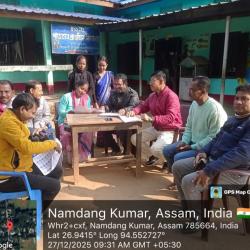Sai itna dijiye, ja main kutumb samaye || Main bhi bhukha na rahu, sadhu na bhukha jaye
Give that much O God, suffice to envelop my clan || I should not suffer cravings, nor the visitor goes unfed
-Saint Kabir
In Hinduism, Buddhism, Sikhism and Jainsim, ‘dana’ that is giving or sharing is an important part of one’s religious practice. Dana is a Sanskrit and Pali word that connotes the virtue of generosity and is an ancient practice in Indian traditions. Dana is mentioned in ancient texts as “paropkara” meaning benevolent deed. Here “dana” and “dakshina” differ as “dakshina” is a fee or gift in return for anything taken. “Bhiksha” is more associated with Buddhism and means alms. The Isa Upanishad points out that true happiness and peace lies in detachment, not by renouncing wealth but rather by renouncing our sense of possession.
One of the most common forms of sharing is anna dana, that is sharing food with others. In Indian tradition, a householder is expected to partake food only after it has been reverentially offered to the deities, the mendicant, animals and birds and all those dependent on him. Even today it continues to be an important aspect of people’s way of life.
I remember as a child I always observed my family and neighbours welcoming a beggar with reverence and humility. Currency was neither given nor taken. A bamboo basket with some rice, vegetables and some salt etc. was prepared to hand over to the beggar. And it was no ordinary handover. The lady of the house would bow down, sit on the floor and slowly advance the basket towards the beggar. The beggar, in turn, would bless each member of the family before leaving.
In everyday life, neighbours would bring each other little gifts nearly every day, be it home grown fish, rice, vegetables or fruits.
Osho says: The man who learns the art of sharing is the richest man. He may be poor, but his inner being has a quality that even emperors may feel jealous of.
The man who learns the art of sharing is the richest man in the world. He may be poor, but his inner being is rich.
Dana is more than merely giving, it may involve sharing of resources as well such as building rest houses, planting trees, or providing water in the form of wells or tankers.
Hieun Tsang, the Chinese traveller scholar recorded in the 7th century, the generous nature of King Harshvardana, who happily shared his wealth with his people.
Sharing whatsoever one has without any expectation is like spreading the fragrance of a flower. Bringing out the essence of sharing Osho says -Not because by sharing you will be helping others, no, but by sharing you will be growing. The more you share, the more you grow. It is not only a question of money. If you have knowledge, share it. If you have meditation, share it! If you have love, share it. Whatsoever you have, share it, spread it all over; let it spread like the fragrance of a flower going to the winds. It has nothing to do particularly with poor people. Share with anybody that is available... and there are different types of poor people.
A rich man may be poor because he has never known any love. Share love with him. A poor man may have known love but has not known good food -- share food with him. A rich man may have everything and has no understanding -- share your understanding with him; he is also poor. There are a thousand and one types of poverty. Whatsoever you have, share it.
Sharing is not about virtue or greed of the other world, a special place in heaven. It is about being happy herenow. A hoarder is never a happy man. He goes on hoarding but he cannot relax; he cannot give. He goes on hoarding; whatsoever he gets, but he never enjoys it, because even in enjoying it one has to share it because all enjoyment is a sort of sharing. Joy is always a sharing. It does not exist alone.
One can never be happy alone. Happiness is a relationship. It is togetherness. In fact, even those people who have moved to the mountains and have lived alone, they also have shared with existence, the stars and the mountains and the birds and the trees, they were not alone.
For twelve years Mahavir was alone in the jungles yet he was not alone. He was away from human beings but he was crowded by the whole existence. The whole existence was merging upon him. Then the day came when he had gone beyond, he came back to relate to human beings, to share the joy that he had attained there.
Gautama Buddha went into the forest and came back to share it. It is not a question of whether the other has it or not. The question is that when one has, he has to share. Sharing is out of one’s abundance. Sharing is out of one’s inner richness.
In India the lady of the house is often blessed by elders that no visitor should return from her house unfed and that the blessings of Ma Annapurna (the Goddess of food and nourishment) may shower on her always. It has been many times, observed that the lady of the house eats after everybody else. It is not about she being lower in status in the family but it has a very different connotation altogether. According to Hindu tradition, the first part of the food belongs to the guests and the poor, the second to animals and birds, the third to children, the fourth to the husband and last comes the lady/mother and she would happily feed everybody before she settles for her own meal. That’s why probably mothers are worshipped as Goddesses in this country. For they take care of not only their families but also visitors and animals and birds.
In Hinduism, the role of cooking and feeding is not that of a servant, it is rather seen as a divine role, a manifestation of Ma Annapurna from whom, according to mythology, Lord Shiva receives food as alms.
The co-founder of the theosophical movement, Madame Blavatsky had a strange habit her whole life. She had traveled widely and during her travels she carried bags of flower seeds with her. From the train window she would go on throwing seeds and when people would ask why, she used to say “These are seeds of flowers, beautiful flowers. When the summer goes and the rains come, these seeds will become plants. Soon there will be millions of flowers. I will not be coming back on the route and I will never see them, but thousands of people will see them, thousands of people will enjoy their fragrance. My joy is that so many people will be joyful. I am not a miser. Whatever I can do to make people joyful, happy, I will do; it is part of my love.” Madame Blavatsky really loved humanity, and did everything that she could.
Share! Whatsoever you have, share... and it will grow. That is a fundamental law: the more you give, the more you get. Never be a miser in giving. OSHO
- 10650 reads










Add new comment